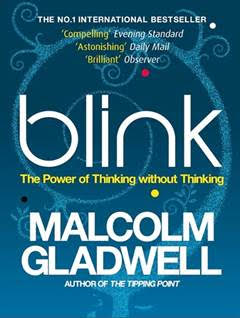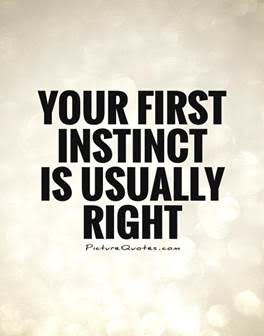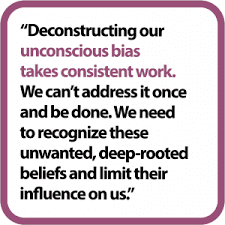Blink
Author: Malcolm Gladwell
Genre: Management, Psychology, Self Help, Popular Science

Malcolm Gladwell has struck gold. He has written 5 books (Tipping, Point, Outliers, Blink…) and ALL of them became bestsellers! He also got profiled in Times Most Influential people.
So what is Blink all about? That often decisions made very quickly (at the blink of an eye) can be as good as those made with a lot of thoughtful analysis. Because the subconscious part of brain uses years of experience and ‘thin slicing’ (rapid judgement based on small amount of data but complemented with years of experience stored in the subconscious) to immediately get an insight that the rational part of brain will take much longer to arrive at. Hence the subtitle of the book: The Power Of Thinking Without Thinking.

In one study, players took 80 attempts to consciously explain there was something wrong between two deck of cards, 40 attempts to understand something was wrong (though not being able to explain exactly what was wrong), but only 10 to subconsciously know something was wrong (their palms became sweaty and, without conscious knowledge, they actually started choosing the right deck!).
These subconscious leanings manifest themselves through subtle cues that can be understood and harnessed. John Gottman, profiled in the book, needs just a 15-minute meeting with couples to very accurately predict whether or not they are headed towards a divorce. Because in his “love lab” near University of Washington, he has recorded thousands of couple conversations in very minute detail: every second of interaction has one of 27 different emotions attached to it and ranked (Disgust -1, Contempt -2, Anger -3…). So what appears like a normal conversation to the untrained eye, is a wealth of information to him. He looks for signs of the 4 de-railers of any marriage – defensiveness, stonewalling, criticism and contempt, and if the negative score is higher than positive, you know there is trouble.
Beyond this, Gladwell gives many examples: speed dating, students like or dislike of a teacher, expert opinions, face reading, all to prove that what was decided in seconds was as accurate, often more, than a more deliberate response. Overall, Gladwell makes a strong case that sometimes our instincts, our gut feel may indeed be right.

In the speed dating example, people rated on a scale of 1 to 10 what they were consciously looking for in a partner: attractiveness, shared interests, sense of humour, sincerity, intelligence and ambition. Then they actually speed date and like or dislike a person based on snap judgement. The interesting thing is that what we claim to be looking for in a date is actually very different from what we actually choose in speed dating! Even more, after choosing a date, if the researchers ask again what they would ideally look for, the adjectives used will change and become closer to the partner they just chose. It’s as if “the real me is the me revealed by my actions”. What really attracts us to another is not something the conscious mind can rationally categorize, it’s a mixture of things that comes out in a ‘snap judgement’!
However, he also shows that, if not done well, these same subconscious leanings can become biases, stereotypes and prejudices. Gives the example of how the world tends to relate success with height: the vast majority of Fortune 500 CEOs are tall and imposing, far higher percentage than in the general population. Because subconsciously interviewers relate height with success and tend to disadvantage shorter but deserving candidates. Similarly, Love at first site could be because the person really clicks but it could also be our biases that will later prove a liability (marry in haste, repent at leisure). There are other examples too of hidden racial biases that show in poorer selection rates, or even higher arrest rates, of minority candidates.

The big question is when do we go by judgement and when by rational analysis? Gladwell gives a controversial answer: in simple things, he suggests doing a rational analysis. But in complicated decisions, where there are many variables, he claims our unconscious decision making may be superior. He admits though that “the task of figuring out how to combine the best of conscious deliberation and instinctive judgement is one of the great challenges of our time”.

While the concept of blink is really interesting and presented well, the multiple examples and detailed story telling become repetitive after a point in time. The writer in him takes precedence over the researcher with the use of flowery language and interesting anecdotes but it’s a moot point whether those anecdotes share the rigour of a scientific analysis. Gladwell is a journalist (with New York Times) and not a researcher or doctor, and his work has been criticized as presented with flimsy evidence. (one sample criticism: “when a writer’s education on a topic consists in interviewing an expert, he is apt to offer generalizations that are banal, obtuse or flat wrong”)
Why should you read the book: To start trusting your subconscious more. And to know when your instincts may just be right and when you have prejudices which you will need to filter. In a certain sense, this knowledge can help us actually develop our instincts as a power, not magical but at least appearing very close!
Goodreads Link: Blink: The Power of Thinking Without Thinking by Malcolm Gladwell | Goodreads

 This information will never be shared with third party
This information will never be shared with third party
Post A Comment
Want to join the discussion?Feel free to contribute!